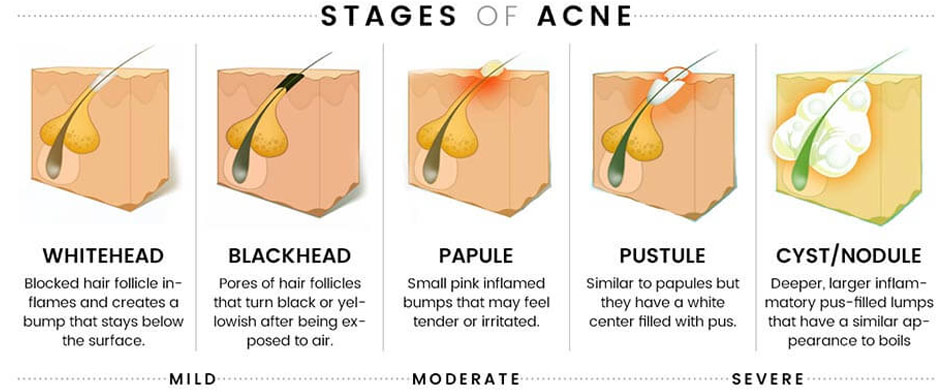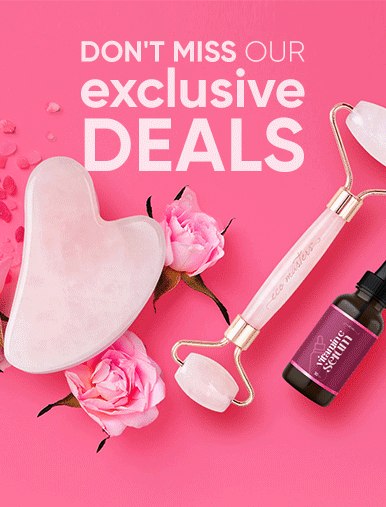An incredible number of men and women in the United Kingdom suffer from acne at some stage in life. Acne is one of the most common skin disorders affecting more than 90% of all teenagers, nearly 50% of all adult women and 25% of adults in total. This means you aren't alone in facing this embarrassing problem.
Both men and women have to deal with the issues of ageing, pigmentation, skin sensitivity and acne. While over 80% men and women suffer from acne in an early age, 5% women and 1% men suffer from adult acne too. Adult acne is more common in women as compared to men due to hormonal imbalances caused during menstruation, menopause or pregnancy. Teenage boys are more likely to have severe acne as compared to girls as the release of male hormone testosterone increases the production of sebum.
What Is Acne?
Acne also known as Acne Vulgaris is a skin condition that can be non-inflammatory, inflammatory, or a mixture of both, causing spots to develop on the face, neck, chest, back, shoulders, and upper arms. A few people also experience butt acne. It's a condition that can affect anyone regardless of their gender, age, skin colour. Acne is also known as pimples, breakouts, blemishes and zits.
Any interference in the function of sebaceous glands can lead to acne breakouts. Excess secretion of sebum results in clogging of the skin pores. These pores filled with sebum and dead skin become breeding grounds for acne bacteria causing inflammations and flare-ups.
It can last for many months and sometimes years, if left untreated. You can get your hands on a variety of acne solutions available today for almost every form of this condition or simply talk with the dermatologist to prevent it.

Types of acne
1. White heads
This type of acne forms when excess sebum, bacteria and dead skin cells get trapped within the hair follicles causing the affected pore to bulge.
2. Blackheads
Unlike the whitehead that is formed under the surface of the closed skin pore, blackheads open to the skin surface and darkens due to oxidation.
3. Pimples
Pimples are red spots with a white centre that develops when the blocked hair follicle gets infected or inflamed.
4. Pustules
Commonly known as zits, these are inflamed and contain pus. These are painful, hard and unsightly.
5. Papules
Papules are tender bumps that appear clearly on the skin in the form of red, and inflamed boils. They can cause scarring and break out if popped.
6. Cysts
When blockage and inflammation occurs deep inside your hair follicle, a fluid filled lump forms underneath the surface of the skin. These are known as blind pimples, can be painful and are the most severe forms of acne that may result in scars too.
8 Causes Of Acne
While there are many possible solutions for acne that can help restore your skin health, before using any of them it's important to know what causes acne and what type of acne you suffer from. Knowing your acne condition well enough can serve as the first step towards treating it. Following are the leading causes of acne:
- Oil and dead skin - Acne is caused when the hair follicles underneath skin become plugged with excess of oil and dead skin cells.
- Excess sebum - When the sebaceous glands secrete excess sebum and dead skin cells, the two accumulate in the hair follicle to form a soft plug. This creates an environment for the bacteria to thrive upon.
- Puberty - Production of androgen hormones is at its peak during puberty in both, boys and girls. This causes the sebaceous glands to widen and produce excess sebum, thereby causing breakouts.
- Hormonal imbalance - Hormonal fluctuation caused during pregnancy or due to consuming oral contraceptives may also affect sebum production.
- Diseases - Health conditions like PCOS, diabetes, few types of thyroiditis can also cause acne. Raised insulin levels increase the sebum production which can lead to acne. Conditions like thyroiditis and PCOS cause hormonal imbalance which may result in acne flare-ups.
- Carb-rich foods - Recent studies have shown that consuming excess of dairy products and carbohydrate rich foods (bagels, breads, etc.) can lead to acne.
- Medication - If your ongoing medications contain corticosteroids, androgens or lithium as ingredients, it may lead to acne.
- Stress - When stressed, the body releases cortisone, a hormone that fights stress. Along with this hormone, a small amount of testosterone is also released which in turn produces more oil in the body and can cause acne. Stress can make acne worse for women than men as the sudden release of testosterone affects the hormonal balance.
Which Skin Types Are More Prone To Acne Problems?
Over 90% men and women across the world suffer from acne once in their lifetime regardless of their skin type. There are some skin types that are a little more prone to flare-ups than the others. Just like teenage boys are more prone to acne than girls and adult women suffer from acne breakouts more often than adult males. You need to identify your skin type first and then find solutions to prevent acne.
1. Oily skin and acne
Oily skin is more prone to acne when compared to other skin types. This is due to excess oil secretion.The excess oil tends to clog the pores and become breeding ground for acne bacteria. Over washing the face isn’t a solution to this problem as the skin will produce more oil in turn causing further breakouts.
2. Dry skin and acne
If you think dry skin isn’t acne prone, you’re mistaken. Since dry skin produces more dead cells, these easily clog the open pores and develop acne bacteria. Hence people with dry skin need to battle acne too. Exfoliation must be avoided during acne flare-ups. Using a good moisturizer will prevent dry and dead skin cells and help combat acne flare-ups.
3. Sensitive skin and acne

Since sensitive skin isn’t capable of fighting bacteria, it’s more prone to acne breakouts. Sensitive skin easily gets irritated with most skin care products which can cause inflammation and acne breakouts. Those with sensitive skin have to be more careful in choosing the right solution for acne.
Tips To Prevent Acne
- Wash your face twice daily. It helps remove the excess oil, dirt and sweat off your face. Pat dry your face instead of rubbing it to wipe as it irritates the skin and can cause inflammation.
- Choose skin care products that suit your skin type. For instance, choosing oil based products for oily skin will cause more harm than good.
- Drink sufficient water. It will help cleanse your skin inside out and keep it hydrated.
- Limit the use of makeup. Use non-comedogenic and natural makeup products.
- Use sunscreen regularly as it helps regulate the production of sebum.
- Consume nutritious and healthy foods. Stay away from sodas, excess sugar and oily foods.
- Change your sheets and pillow cases regularly as the oil and dirt collected in them can cause acne breakouts.
- Studies indicate that stress causes acne breakouts too. They say exercise and meditation can help keep the stress away.
Tips For Acne Prone Skin
There is a brighter side. Natural acne care products contain ingredients which are known to help towards healthier and radiant skin. While it’s essential to use a right acne product, it’s not all that will help you beat acne. There’s more to acne treatment than just applying acne creams. Here’s what else you need to do in order to get rid of pimples and prevent them from coming back:
1. 6 tips to beat acne
- Don’t keep touching your blemishes all the time. When you have acne, the dirt and bacteria on your hands can lead to more breakouts. So, keep your hands off the face.
- Over cleansing can cause problems. Excessive washing can strip your skin off natural oils, triggering production of sebum in oil glands, which may lead to acne. Use a gentle yet effective cleanser twice a day.
- Don’t sleep with your make-up on. The chemical and oils in the make-up easily clog your pores, causing more blemishes. So, always remove your make-up before you hit the bed.
- It’s best to avoid makeup when you’re suffering from acne. If it’s unavoidable, use water based products instead of oil based ones.
- Moisturising is essential. When you have acne-prone skin, use a water based moisturiser once or twice a day.
- It’s important to note that the above mentioned suggestions may only help speed up the acne healing and you need to use effective acne products to reduce pimples.
Best Skincare Routine For Acne Prone Skin/Acneic Skin
Just applying acne creams and not washing your face regularly or sleeping with makeup on, isn't going to help you solve acne problems. You need to follow a proper skincare routine to get rid of acne.
1. Cleanse
Gently cleanse your face with a water-based cleanser using your fingertips.
2. Tone
Toners and astringents fight blackheads. Choose an alcohol-free toner that suits your skin type.
3. Moisturise
Seal it with a water based moisturizer to keep skin hydrated.
Treatments For Acne
Treatments for acne are used when acne is widespread. For a mild level of acne, alternative solutions are a better option. When over the counter solutions don’t work, one may approach a GP or dermatologist for understanding the condition and finding a solution to get rid of the acne. Following are some of the acne treatments available in the market:
Prescription medication: A GP or dermatologist may prescribe certain antibiotics or prescription gels, creams and tablets to help combat acne. These are known to cause a host of side effects not just to the skin but body and hair.
Therapies: Hormonal therapies or photodynamic therapies are also used to handle severe acne. These, however, need to be followed under medical supervision and post a thorough check up.
Acne facials: Just like home remedies or topical creams, acne facials don’t show instant results. Acne facials are an alternative solution for mild acne and to get rid of blackheads and whiteheads. Advanced acne will need advanced care and other forms of treatments.
Cosmetic treatments: Dermabrasion, chemical peels, laser treatments are also used for restoring the skin’s natural appearance and getting rid of dark spots and acne. The effectiveness of these treatments varies from person to person and are very expensive.
Alternative Solutions For Acne

While searching for acne solution, it’s important to ensure that it not only helps beat acne but also keeps it from coming back. Read on to know some effective and safe acne solutions:
Lotions, creams or gels: Gels, lotions or topical creams may help towards keeping the skin hydrated which can help reduce the appearance of scars if used regularly. They also prevent the dust or dirt from getting absorbed in the skin and make acne marks less noticeable. Choosing products with hyaluronic acid in the ingredients is advisable as it helps create a protective barrier for the skin and retains the hydrating properties of the skin.
Home remedies: Coconut oil, Manuka honey, tea tree oil and other such natural ingredients with antibacterial properties are often recommended to help with acne.
Herbal supplements: Herbal supplements are a preferred method when compared to conventional drugs, as the ingredients are natural and helps to address the problem from within. Depending on the composition of ingredients in the supplements these tackle skin problems like excess sebum production, may act as blood purifiers, reduce inflammation, unclog the pores and regulate the hormones. These are known to have lesser side effects too. You can also follow these do's and don'ts for acne
The Final Word
Getting rid of acne completely can be a long and challenging process with no overnight results. In fact, most dermatologists and experts recommend a period of 6-8 weeks for notable results. Modifying the way you maintain your skin and amending your dietary habits can help you in the long run. This may not only help prevent acne but also contribute to the efficacy of acne solutions you use.
The market is flooding with harsh, chemical laden products that can sometimes aggravate the condition or cause severe side-effects. Herbal supplements, due to the list of natural ingredients present in them, are becoming increasingly popular as they’re known to have lesser side effects. Hence, it’s best to research about the various treatments or solutions available for acne and select the one that best suits your skin type and acne condition.


